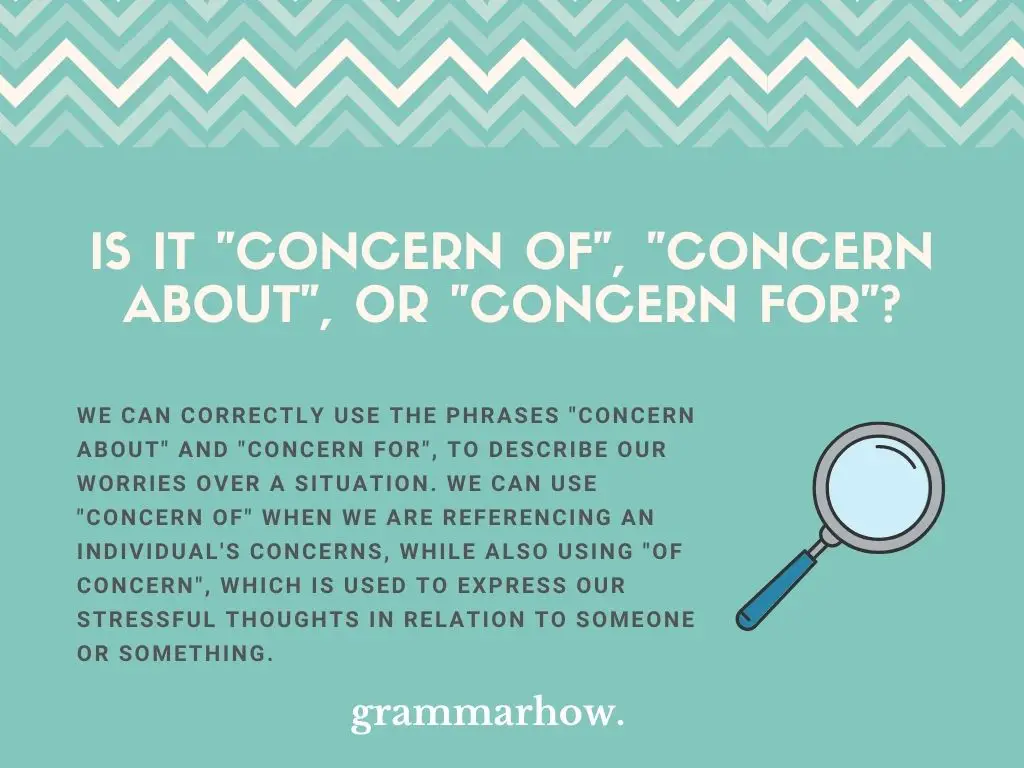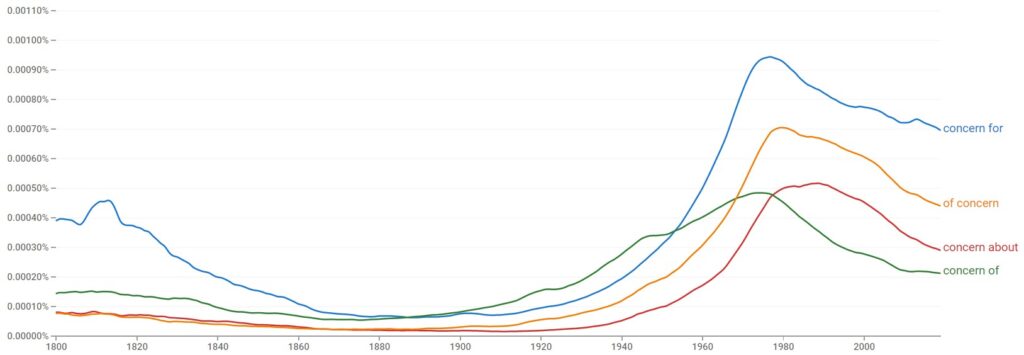The phrases “concern of”, “concern about” and “concern for” are all very similar, which can often cause folks some confusion in regards to which phrase is the correct one to utilize. In this article, we will be taking an in-depth look at these phrases, their use, and their specific meaning.
Is It “Concern Of”, “Concern About”, Or “Concern For”?
We can correctly use the phrases “concern about” and “concern for”, to describe our worries over a situation. We can use “concern of” when we are referencing an individual’s concerns, while also using “of concern”, which is used to express our stressful thoughts in relation to someone or something.

It’s also important to note that we will often see the term “concern” changed to “concerned” when used with the prepositions “about” and “for”. This is because “concerned” is both the adjective form and the past tense/past participle of “concern” – which can sometimes be necessary to use to form a correct and coherent sentence.
What Does “Concern Of” Mean?
When we use the phrase “concern of”. we are referencing another individual’s concerns, which we are essentially paraphrasing or acknowledging. When we say that something is “of concern” to us, we are meaning to express that something is worrying, troubling, or entirely unsatisfactory to us.
Often, when something is “of concern” to us, it brings us a great deal of stress of anxiety. At the same time, we can consider something that is “of concern” to hold a great deal of importance to us.
We can now look over a few examples that show how we can adequately use both of these phrases in a sentence:
Concern Of
- It’s a concern of my mother’s – not mine.
- It’s absolutely no concern of my own.
- That’s no concern of Chris’s, so I wouldn’t bother him.
- It’s a concern of my teachers that I won’t graduate on time.
- It’s a concern of my parents, don’t worry about it.
Of Concern
- An injury or illness to a child is always a great deal of concern to their parents.
- There is a great deal of concern revolving around his upcoming trial.
- It shouldn’t be of concern to the bank how my bills are paid, as long as they are paid.
- Climate change should be an issue of concern to all countries and their governments.
- The survey’s data and findings are a matter of concern to Statistics Canada.
What Does “Concern About” Mean?
When we say that we have a “concern about” or are “concerned about” something, we are expressing that we have a deep-rooted feeling of worry or care about a specific person, occurrence, thing, etc. Generally, we will have “concerns about” something that we value or is of importance to us.
At the same time, a “concern about” something can be considered something that we are in relation to or connects us to others. This happens when a “concern” is universal or a feeling that many people share on the same subject, topic, etc.
We will also say we have a “concern about” something that we feel may put something or someone else at an increased risk, like climate change.
Here are a few examples of how we can appropriately use this phrase in a sentence:
- We should share similar concerns about the lack of clean drinking water on Indigenous reserves.
- I am very concerned about her grades and her lack of effort in class.
- They have avid concerns about the cost of restoration.
- Climate change is something that all countries should share concerns about.
- If you’re that concerned about the way your hair looks, shave your head.
What Does “Concern For” Mean?
When we are expressing that we have a “concern for” someone or something, we are saying that we feel compelled to care about the specific situation or circumstances. We will often show “concern for” something that we think is potentially at risk or even in danger.
Because of this, a “concern” for someone or something often involves internal strife or anxiety, especially when others do not share in our concerns. This may also be something that we consider a matter of great interest or something that we believe will negatively affect someone or something.
We will now go over some examples that showcase how we can use this phrase in a sentence:
- He showed constant concern for human rights violations.
- I am concerned for you and the struggles you are facing.
- She had shown a genuine concern for the poor populations.
- My father showed a great level of concern for the economic state of our country.
- We are concerned for your family and your well-being.
Are “Concern Of”, “Concern About” and “Concern For” Interchangeable?
We can use “concern about” and “concern for” interchangeably, as they are quite consistent in meaning and will be understood as showing a high level of care, regardless of which particular phrase is used. We cannot use “concern of” the same way, as we are discussing someone else’s concerns.
If something is “of concern” to us, then we are “concerned about” it or showing a “concern for” it. Therefore, we can use this phrase interchangeably as well.
It is important to note that instead of utilizing these phrases, we can merely state that we are “concerned” or that we “have a concern”. This term and phrase will also convey a consistent meaning, one that will be understood by any English speaker.
Is “Concern Of”, “Concern About”, Or “Concern For” Used The Most?
As shown by the data provided by Google Ngram Viewer it’s clear that “concern for” is the most commonly utilized phrase in the English language, in the present day. However, this was not always the case – with “concern about” and “concern of” taking turns as the most popularly used phrase.

In the early to mid-1500s “concern about” was far more popularly used than the other two phrases, before falling into near obscurity towards the late 1500s. It would continue to see seldom use in comparison to the other two phrases, until the mid-1900s.
We can also see that “concern of” had slight peaks, like in the mid-1500s and mid-1600s, where it was the most commonly used phrase – although the difference in use between the other two phrases is slightly marginal. However, the use of “concern of” from the 1700s to the present day has always been rather consistent with “concern about”.
Moreover, we are able to notice that “of concern” is used slightly less in the present day than “concern for”, however, it is used more than “concern of” and “concern about” – showcasing that this phrase has more uses. However, before the 1960s, this phrase was used consistently with “concern about”.
Lastly, we can see that “concern for” has seen large peaks in popularity of use. These peaks are quite substantial, compared to that of the other two phrases. From the 1700s to approximately the 1850s, this phrase saw a large burst in use, similarly to the 1950s into the present day.
Is It Ever Correct To Use “Concern Over”?
We can certainly choose to use the phrase “concern over”. Similarly, to “concern about” and “concern for”, we may see the phrase changed to “concerned over” – to emphasize the past tense or past participle. To show “concern over” something is to focus our attention or care on that issue.
At the same time, when we show “concern over” someone or something, we may have assumed a feeling of responsibility for the situation.
We will now go over a few examples that highlight how we can utilize this phrase correctly:
- The police are not alone in their concern over illegal substance usage.
- We expressed our concern over the fate of our dance group.
- The price drop was due to the growing concern over taxes.
- Concern over Colombia’s political troubles has heightened.
- The growing concern over climate change must be addressed.

Martin holds a Master’s degree in Finance and International Business. He has six years of experience in professional communication with clients, executives, and colleagues. Furthermore, he has teaching experience from Aarhus University. Martin has been featured as an expert in communication and teaching on Forbes and Shopify. Read more about Martin here.
